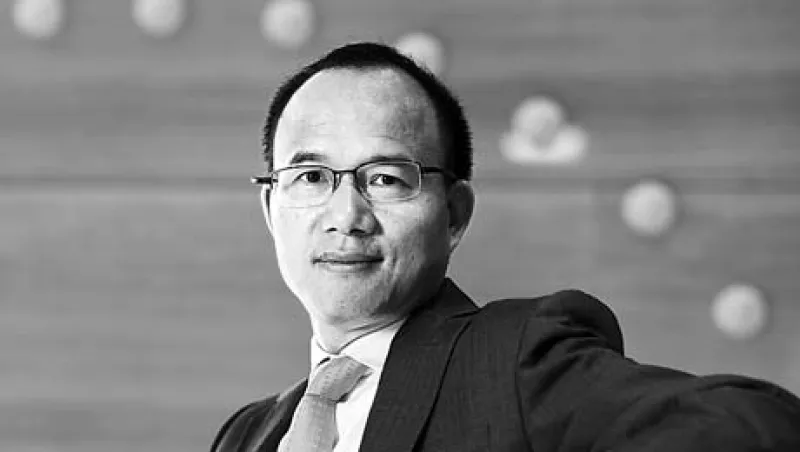Long before investors developed their latest love affair with gold, executives at the Shanghai-based Fosun group saw its potential. In late 2003, when the precious metal was selling at $300 an ounce, the conglomerate learned through government contacts that a loss-making, state-owned gold mining company in northeastern China was desperate for capital to finance a restructuring and upgrade its technology. The executives, who were gearing Fosun to China’s rapidly growing middle class and anticipating an increasing appetite for gold jewelry among Chinese women, smelled an opportunity. They invested 161 million yuan ($25 million) for a 20 percent stake in Zhaojin Mining Industry Co. and persuaded an 18 percent-owned Fosun affiliate, Shanghai Yuyuan Tourist Mart Co., to do the same. In the process the two companies became the first private investors in a Chinese gold mining company.
Fosun’s biggest challenge was cultural: getting Zhaojin management to respond to a profit-driven board that included two Fosun representatives, rather than to government regulators. To that end, the new shareholders instituted a benchmarking system that set targets for containing costs even as the company ramped up production. They also boosted research and development spending, a move that helped Zhaojin develop a patented oxidation technique that improved the company’s gold extraction rates while reducing costs by 22 percent. Over the next three years, Zhaojin quadrupled its production while keeping costs below those of its rivals, boosting the company’s gross profit margin to 55 percent, the highest in China’s gold mining industry.
The turnaround allowed the company to go public in 2006 with an initial public offering on the Hong Kong Stock Exchange that raised HK$2.5 billion ($320 million) and diluted Fosun’s stake to 14.55 percent. In 2008, Fosun sold 10.9 percent of Zhaojin to Yuyuan Tourist Mart for 394 million yuan, generating a 246 percent return on its initial investment. The group retains a 3.65 percent stake that’s currently worth HK$845 million.
“China’s steel and mining industries were suffering from oversupply, but we took a contrarian view,” says Fosun co-founder and CEO Liang Xinjun, who still sits on Zhaojin’s board and is chairman of the mining company’s compensation and nominating committees. “We went into gold and iron ore when others were hesitant. We invested in industries that we believe can benefit from China’s longer growth trajectory, and we invest at discounts to market prices.”
That simple but effective strategy has helped Fosun become one of China’s leading investment companies. Founded in the early 1990s by Liang and four college classmates, Fosun has built a portfolio of investments in more than 50 companies focused on real estate, steel, commodities, mining and pharmaceuticals. Those investments generated revenues of 44.6 billion yuan, or nearly $7 billion, last year. Steel and commodities provided 74 percent of revenues, real estate 20 percent and pharmaceuticals, media and other interests the remainder.
As big as Fosun has become, it’s only the start of the executives’ ambitions. In 2007 they listed the group’s parent company, Fosun International, on the Hong Kong Stock Exchange. The initial public offering raised HK$11.5 billion from investors including Saudi Prince Alwaleed bin-Talal and Hong Kong billionaire Li Ka-shing. Since the IPO, Fosun has moved aggressively into private equity. It formed partnerships in China with U.S. buyout giant Carlyle Group last year and with insurer Prudential Financial in January 2011. Fosun is also starting to venture abroad, taking stakes recently in Paris-based resort operator Club Méditerranée and Greek fashion retailer Folli Follie Group.
Four strategic themes guide Fosun’s investment: Chinese urbanization, growing consumer demand, companies moving up the value chain and China’s shift from being a recipient to a major exporter of capital. “We will invest in domestic enterprises that will grow, and we will invest in global enterprises that can benefit from China’s growth,” Liang, 43, told Institutional Investor in a recent interview at the Shanghai International Convention Center, where he had just hosted 400 staff and associates of the group’s investment and private equity divisions.
Guo Guangchang, chairman and co-founder of the group, likens Fosun’s value investing and long-term strategic approach to that of Warren Buffett. “With regard to the business models Fosun would like to learn from, Mr. Buffett’s Berkshire Hathaway is definitely on our list,” says Guo, 44. Guo and Liang are certainly on their way to amassing Buffett-style wealth. According to Forbes magazine, Guo is the 27th-richest person in China, with a worth of some 17.5 billion yuan, while Liang ranks 132nd with 6.5 billion yuan.
Fosun’s executives lead a new generation of private entrepreneurs in China who are increasingly driving the country’s markets and beginning to step onto the world stage as investors.
A decade ago foreign firms were introducing the concepts of private equity and venture capital to China. Buyout firms such as Carlyle, Texas Pacific Group and Warburg Pincus were making some of their first deals in the country. Goldman Sachs Group was an early investor in e-commerce company Alibaba.com; Internet portal Sina.com won backing from Taiwanese computer maker Acer and its former chairman, Stan Shih; and Internet search company Baidu counted the Silicon Valley venture capital outfit Draper Fisher Jurvetson as a key early investor.
These foreign firms are still active in China, but domestic players are increasingly dominating the investment landscape. In 2006 the government barred Chinese companies from establishing offshore entities that could take U.S. dollar or foreign currency investments. The rule put foreign firms at an effective disadvantage, as they could invest only in their own wholly owned subsidiaries or in Chinese companies that had offshore units before 2006. To invest elsewhere in China, foreigners had to use yuan, which are difficult to obtain because of exchange controls. In addition, each foreign transaction had to be approved by the Ministry of Commerce and the State Administration of Foreign Exchange, the central bank arm that manages China’s $3.2 trillion in foreign exchange reserves and actively weeds out U.S. dollar investments that it doesn’t think China needs. SAFE tends to prefer foreign investments in the technology sector and habitually rejects foreign participation in Chinese real estate, which the government fears is becoming a bubble, or anything remotely to do with China’s defense sector.
By contrast, Chinese investment firms are booming. Last year 240 private equity and venture capital funds raised the equivalent of $38.8 billion, up 200 percent from 2009, according to Hubert Tse, a partner at Shanghai-based law firm Boss & Young. Chinese private equity and venture capital firms so far have made 1,180 transactions, worth more than $15.8 billion, according to Zero2IPO Group, a Beijing-based research firm. More than 550 funds have exited from their investments, which have led to 491 initial public offerings of stock.
China has driven the global IPO market for the past few years. Last year 408 Chinese companies raised $99.6 billion in IPOs in Shenzhen, Shanghai and Hong Kong, according to research firm Dealogic. Since the launch of the ChiNext exchange in Shenzhen in 2009, 162 small and medium-size enterprises — most of them technology start-ups — have raised $18.6 billion. “The exit channel in China is expanding, and it’s coming with the encouragement and support of the central government,” notes Tse.
The prospect for continued growth appears bright given the economy’s strong growth rate and the modest scale of the private equity industry, says Tse. The combined size of the country’s private equity and venture capital investments amounts to just 1 percent of gross domestic product, he says, less than one third the level in the U.S.
Last year Fosun had six IPOs from its portfolio, five of them on domestic exchanges and one in Hong Kong. The deals raised a total of more than 10 billion yuan and reaped 2.26 billion yuan for Fosun. The internal rates of return on Fosun’s investments in those companies ranged from 64 to 268 percent, says George Choi, a Hong Kong–based analyst at Citigroup. “Fosun has already developed a successful track record for private equity investments,” he says.
Fosun has come a long way since Guo and Liang met at Shanghai’s prestigious Fudan University. Guo graduated in 1992 with a BA in philosophy and stayed on to work in the Communist Youth League, where he met Liang, a genetics student. Guo had planned on going to the U.S. for graduate school but decided he would do better to use his $4,500 in savings to start a business. He teamed up with Liang and Tan Jian, a computer science student and granddaughter of Tan Jiazhen, a U.S.-trained scientist who founded the genetics department at Fudan in the early 1950s and later became vice president of the university.
In 1992 the three founded Guangxin Technology Consulting to advise Taiwanese companies seeking to enter the Chinese market and to help wealthy locals buy Shanghai property. (Guo and Tan would marry and later divorce.) They also set up a laboratory to offer pharmaceuticals companies premarket drug analysis services.
In 1994 two individuals who had studied genetics with Liang, Wang Qunbin and Fan Wei, joined the group and helped them found a holding company, Shanghai Fosun High Technology (Group) Co. The company expanded its pharmaceuticals business to develop insulin as well as medications for liver and cardiovascular diseases. In 1998, Fosun High Tech spun off the drugs unit, Shanghai Fosun Pharmaceuticals (Group) Co., via an IPO on the Shanghai Stock Exchange. The landmark deal raised Fosun’s profile, and that of its founders. It was the first A-share offering in Shanghai by a private company and raised 357 million yuan.
Guo is known as a consummate networker who used the Communist Youth League to form relationships with Shanghai officials and develop his own political profile. He was a member of the Chinese People’s Political Consultative Conference, which advises the government on policy, and since 2003 he has been a member of the country’s legislature, the National People’s Congress. The reputation and connections of Tan’s grandfather, who was known as the father of Chinese genetics, also helped the group gain access to government officials and get an inside track on deals, sources say.
“They work closely with the government, both local and central, and they often retain the services of former officials to help them open doors that may not open otherwise,” says one foreign executive who advises foreign and Chinese private equity firms and has worked on deals with Fosun. “This is how they secure investments that others can never get, especially in acquiring highly valuable state assets that need very little restructuring.”
The founders meet weekly and talk more frequently on the telephone. Guo sets the broad group strategy; Liang is CEO and oversees investor relations and international cooperation; Wang is the effective COO and heads the pharmaceuticals business; and Fan looks after real estate development. Tan has little involvement in group operations but runs a subsidiary that operates a Shanghai chain of health clubs.
The success of Fosun Pharmaceuticals prompted a number of state-owned drug companies to approach Fosun for advice on restructuring and going public. Fosun ended up working with China National Pharmaceutical Group Corp., one of the country’s leading drugmakers. They helped the company set up a national wholesale and retail arm, Sinopharm Group Co., and invested a total of 813 million yuan between 2003 and 2006 for a 49 percent stake in the unit. Fosun then did the legwork to prepare Sinopharm for a public listing. In 2009 the company launched an IPO on the Hong Kong stock exchange. The deal raised HK$8.73 billion and was 600 times oversubscribed. Investors included Government of Singapore Investment Corp., the city-state’s sovereign wealth fund. Fosun International retains a 34 percent stake in the company that’s now worth some HK$17.9 billion.
Fosun has also moved aggressively into steel and commodities, part of its bet on the country’s rapid urbanization. In 2003, Fosun teamed up with Nanjing Group, a sprawling but marginally profitable state-owned steel giant, to help it restructure. Fosun and its affiliates paid 1.55 billion yuan for a newly created subsidiary, Nanjing Steel United Co., that came with a controlling stake in Shanghai-listed Nanjing Iron & Steel Co. Then Fosun moved to ramp up productivity by setting benchmarks based on the performances of Nanjing Steel’s top three domestic rivals. Over the next six years, Nanjing Steel slashed its payroll by 35 percent, to 11,000, cut middle management by 40 percent and reduced the number of its subsidiaries from 57 to 37. The company also invested more than 200 million yuan in new production equipment and shifted output from low-margin products to higher-value items such as steel plate for light manufacturers and pipeline for the petroleum industry. Nanjing Steel was China’s second-most-profitable steelmaker in 2009, generating a large share of the 1.1 billion yuan in profits that Fosun earned from steel that year. Those profits fell to 410 million yuan in 2010, partly because of rising iron ore prices, but they rebounded 17 percent in the first half of 2011, to 272 million yuan, as ore prices receded.
Property, one of the areas where Guo and Liang got their start, remains a core business for Fosun. The group’s real estate flagship is Shanghai Forte Land Co., a major commercial and residential developer that Fosun founded in 1998. The company is currently developing 10.4 million square meters (112 million square feet) of projects in Shanghai and ten other cities across China, ranging from medium to high-end residential complexes to shopping malls to office buildings. Shanghai Forte paid $328 million last year to acquire Shanghai Garden Plaza, a 97,000-square-meter luxury residential and commercial complex catering to the expatriate community, from Goldman Sachs.
Concerns about a possible property bubble have mounted in China recently, as prices for real estate in central Beijing and Shanghai have tripled in the past three years, to an average of about 60,000 yuan per square meter. The government has taken steps to cool the market, raising interest rates and bank reserve ratios five times between November 2010 and July 2011, but the moves have only slowed the pace of price increases so far. Standard & Poor’s warned last month that a slowdown in property sales and higher leverage among developers were increasing risks in the sector. Fosun’s net profits from property sales dropped 61 percent in the first half of this year, to 388 million yuan. But executives remain bullish. “I still believe China’s property sector to be an industry with great prospects,” says Wang, Fosun’s president. “China is still urbanizing and will urbanize for years to come.”
Shanghai Forte earned 3.2 billion yuan in 2010 on sales of 8.7 billion yuan. Sales fell 30 percent in the first half of this year, to 4.2 billion yuan. Fosun, which had listed the company in Hong Kong in a HK$1.7 billion IPO in 2004, took Forte private again in May, paying HK$2.6 billion for the 29.44 percent it didn’t own. Many analysts expect the company to seek an A-share listing because the Shanghai market currently values property companies more highly than Hong Kong. Management denies that it plans a Shanghai listing.
The Hong Kong listing of Fosun International in July 2007, which raised HK$11.54 billion for a 20 percent stake, boosted the group’s financial power and brought on board powerful, well-connected investors like Prince Alwaleed and Hong Kong tycoon Li. Spokesmen for the two men declined to comment on their investments in Fosun. Before the IPO, Guo controlled 58 percent of the company, Liang 22 percent and Wang and Fan 10 percent each. The company doesn’t disclose their current stakes.
Fosun has broadened its strategy to include investments in publicly listed companies, especially in the consumer sector. “China is now the world’s second-largest consumer market, and in the coming ten years it may even surpass the U.S. to become the No. 1 consumer market,” says CEO Liang. “We will look at investing in entrepreneurs who make consumption their primary strategy.”
In late 2008 and early 2009, the group paid $280 million to amass a 26.14 percent stake in Focus Media Holding, a Nasdaq Stock Market–listed company that sells advertising online and on electronic billboards in major cities across Asia. The company’s stock price had plunged in the turmoil that followed the collapse of Lehman Brothers Holdings, and Fosun saw that as a buying opportunity. The stock subsequently rebounded by more than 300 percent. In July, Fosun sold a 4.8 percent stake in Focus, generating a gain of $140 million.
To some analysts, the investment had all the earmarks of a Buffett-style play: identifying an oversold stock with a simple business model and good long-term potential. They also like the fact that Fosun took some cash off the table recently. “We believe the partial disposal of Fosun’s stake in Focus Media is positive for Fosun stock,” says Corey Chan, an analyst with Morgan Stanley in Hong Kong. “It demonstrates the management’s flexibility in exiting noncore businesses at a good price. It replenishes holding company cash reserves.”
Fosun has recently financed more of its deals with debt. The group’s track record and transparency have allowed Fosun to borrow from banks to an extent matched by few private Chinese enterprises. Net debt increased to 44 billion yuan at the end of 2010 from 28.8 billion yuan a year earlier, estimates Citigroup’s Choi. Still, he says, Fosun has less leverage than many foreign private equity firms. The company’s debt-to-equity ratio is 0.5, well below Blackstone Group’s 0.94. Earnings before interest, taxes, depreciation and amortization are 8.0 times interest expenses, down from 10.4 times a year ago but still “a healthy level,” Choi says.
The company’s success at home has left it poised to move onto the global stage. Fosun is looking to forge partnerships with foreign firms eager to penetrate the Chinese market and to make investments of its own overseas. “We have strong China experience,” says Liang. “We are qualified to be a leader in China’s private equity industry, but we realize we are not strong internationally. That is why we are partnering with global PE funds.”
In January of last year, Fosun retained former U.S. Treasury secretary John Snow as a board adviser on international investments. Shortly afterward it announced its partnership with Carlyle to jointly launch a $100 million renminbi-denominated fund for investment in China.
“Fosun has an excellent track record in capturing China’s growth opportunities,” says Wayne Tsou, a managing director of Carlyle Group and head of Carlyle Asia Growth Partners. “By working with local partners like Fosun, we expect to make investments that benefit high-growth companies and enhance the local private equity industry.”
Earlier this year Fosun agreed to form the $600 million Pramerica-Fosun China Opportunity Fund, with U.S. insurer Prudential Financial investing $500 million and Fosun chipping in the remainder. “Our partnership with Fosun is based on optimism about the economic prospects for China, as well as the common investment philosophy between the two entities,” says Lisa Villareal, a Newark, New Jersey–based spokeswoman for Prudential. “We trust in Fosun’s investment expertise, industrial base and understanding of local markets.” Liang says the fund is likely to make its first investment in China by the end of this year.
Fosun expects to raise the equivalent of more than 8 billion yuan from investors this year for private equity investments in China and abroad, Liang says. The company will contribute an additional 2 billion yuan of its own funds.
In addition to working with foreign firms in China, Fosun is also looking to expand its horizons abroad. The company established a New York office in October 2010, and it plans to do the same in Europe and Australia. Fosun has already begun sending investment professionals to the U.S., Europe and Japan to scout for potential opportunities in both public and private companies with branded products that might sell well in China and other emerging markets, Liang says.
A case in point is Club Med. Last year Fosun paid $25 million for a 7.1 percent stake in the Paris-based resort operator. The two companies celebrated the deal last December at the new Club Med Yabuli, a ski resort in the Yabuli mountains in northeast China that is Club Med’s first outpost in the country. “Our alliance with Fosun is in line with Club Med’s strategy,” says Henri Giscard d’Estaing, the company’s chairman and son of former French president Valéry Giscard d’Estaing. “Not all our partners become a shareholder. I believe in the future the Fosun–Club Med alliance will seem very natural to all.”
Although China’s per capita income stands at a modest $4,300, the country already boasts 1.4 million households with annual incomes exceeding $35,000, says Liang. “We believe this group will rise to 4 million in the coming five years,” he says. Liang estimates that only 7,000 or so Chinese families visit Club Med resorts each year, but he believes that number will climb sharply, to tens of thousands, in coming years. Caroline Puechoultres, Asia-Pacific CEO of Club Med, says the company aims to open one resort a year in China for the next few years.
As with Club Med and Folli Follie, Fosun will seek to take only minority stakes in foreign companies. “We understand every nation has its nationalism, as we do in China,” Liang says. “We respect that. We only want to invest in companies that can benefit from our China expertise, and help them grow in China.”
How big can Fosun grow? One U.S. private equity adviser, who has worked with Fosun but asked not to be identified by name, says senior management has good instincts and strong domestic experience but is unlikely to be a global force any time soon. “A while back they weren’t even familiar with the 2-and-20 rule,” the adviser says, referring to the standard 2 percent management fee and 20 percent share of profits charged by private equity firms. “They’ve got a long way to go to become global players.”
Fosun executives acknowledge that they face a steep learning curve when it comes to investing globally. But they are confident they can succeed internationally just as they have at home over the past two decades.
“China gained wealth by becoming a global export giant,” says Liang. “The time is coming when China will be a major exporter of capital.” And Fosun is determined to play its part in that process.






